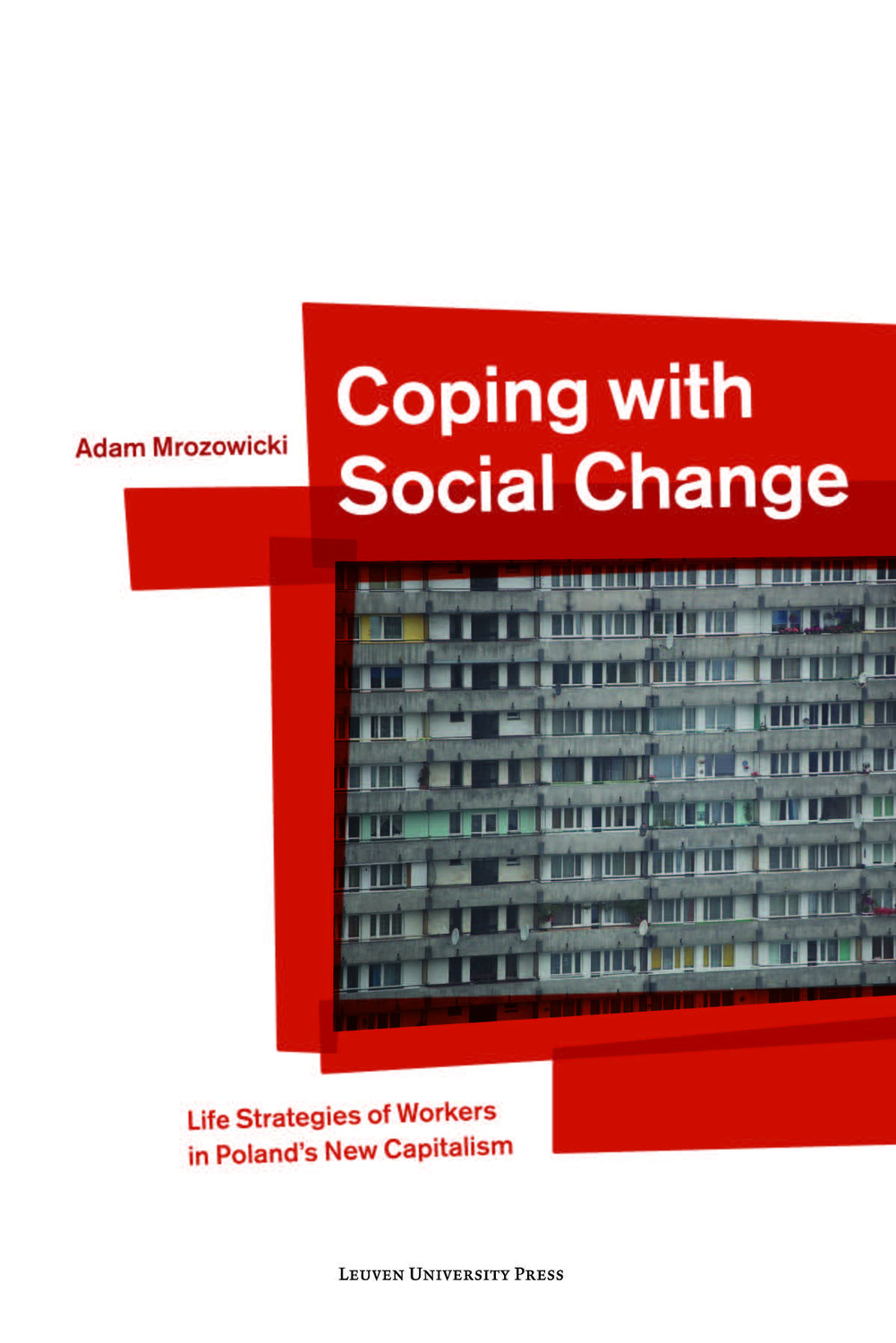
Coping with Social Change
Life Strategies of Workers in Poland's new Capitalism
Adam Mrozowicki
Regular price
€49.50
(including 6% VAT)
Sale
Monograph - paperback
This publication is GPRC-labeled (Guaranteed Peer-Reviewed Content).
ACKNOWLEDGEMENTS
CHAPTER 1
IN SEARCH FOR THE AGENCY OF WORKERS
CHAPTER 2
WORKERS AND CAPITALIST TRANSFORMATION: THE CASE OF POLAND
Rethinking post-socialist capitalism: the frames of sociological understanding
From heroes to rebels:the working class in People's Poland and Silesia
Segmentation of the working-class milieux in state socialism: structural legacies
The socialist makings of the working-class discourse: a cultural legacy of socialism
Post-socialist capitalism and the transformation of workers' milieux
Re-segmentation of the working-class milieux: persistence and change
Workers and a grand narrative of transformation: the end of the working class?
Challenge of understanding: sociologists, workers and a "grand transition"
CHAPTER 3
LIFE STRATEGIES OF WORKERS: THEORETICAL SENSITIVITY
Theories of agency and a critical realist approach
The agency of the weak: rethinking working-class studies
Marxism and structuralist working-class studies
Embourgeoisement and its critics: the early culturalist tradition
Class cultures and reflexive modernisation: new working-class studies
Agency, structure and reflexivity: sociological approaches to life strategies
Life strategies in late modernity: individuality's discourse and reflexivity
The forms of capital, habitus and structured life strategies in Bourdieu's theory
Life strategies, reflexivity and action contexts in Archer's theory
Ethos, resources and reflexivity: the potential for conceptual integration
CHAPTER 4
BACK TO THE PEOPLE:
BIOGRAPHICAL RESEARCH ON POLISH WORKERS
Research process
Data sources: biographical interviews and secondary data
Choice of informants: theoretical sampling and field work practice
Data analysis: GTM coding and biographical analysis
Research contexts, research sites and research participants
Research sites and basic socio-structural characteristics of informants
Evaluation of the research: methodological limitations
CHAPTER 5
NEGOTIATIONG THE MEANING OF THE POST-SOCIALIST TRANSFORMATION
Devaluation of labour and the revaluation of skills
Nostalgic paternalism and pragmatisation of consumption
Contested communitarianism and privatisation of social bonds
The opening of the public sphere and conditional freedom
Embedding in history: ideological frames of remembering Neutralisation of history: the "private frames of remembering"
Understanding the ambivalence: segmentation, strategies and reflexivity
CHAPTER 6
FORMS OF CAPITAL, ETHOS, AND LIFE STRATEGIES OF WORKERS
Body-related resources: work as an ethos and necessity
Socio-psychological resources: resourcefulness and helplessness
Educational resources and craft skills: redefining cultural capital
Social resources at work: embeddedness in work milieu and privatism
Trade union resources and trade union ethos
Resources, reflexivity and career patterns: the typology
Anchor careers
Bricolage careers
Dead-end careers
Patchwork careers
Social resources beyond work: embeddedness in family
Embeddedness in locality and social resources beyond work and family
Economic capital, pragmatism and life styles in the sphere of consumption
Structured and reflexive dimensions of life projects: towards synthesis
CHAPTER 7
COPING WITH SOCIAL CHANGE: THE TYPES AND DYNAMICS OF WORKING-CLASS LIFE STRATEGIES
Workers' strategies after system change: typology building
Embedding: the logic of communitarian persistence
Integrating: the logic of collective co-determination
Getting by: the logic of a privatised survival
Constructing: the logic of a privatised bricolage
Towards theoretical integration: ethos, reflexivity and hybridisation
Social structures, agential powers and the evolution of workers' milieux
CHAPTER 8
THE AGENCY OF THE WEAK: CONCLUSIONS AND IMPLICATIONS
Rethinking the agency of the weak: theoretical implications
Labour studies in Eastern Europe: towards new sociological imagination?
Towards the politics of empowerment
LITERATURE
APPENDICES
Appendix 1.
Narrative interviews with workers. Instruction for interviewers
Phase I: Spontaneous narration
Phase II : Supplementary narrative questions
Phase II : "Theoretical" questions
Appendix 2.
The acquired sample: the structural description of workers' positions
Appendix 3.
Matrix of cases. Core cases and context cases
SUMMARY
Coping with Social Change. Life Strategies of Workers in Poland's New Capitalism
STRESZCZENIE
Sposoby radzenia sobie ze zmianą społeczną. Strategie życiowe robotników w nowym polskim kapitalizmie
Format: Monograph - paperback
Size: 229 × 152 × 15 mm
304 pages
ISBN: 9789058678652
Publication: April 13, 2011
Languages: English
Stock item number: 63186
Adam Mrozowicki is Assistant Professor at the Institute of Sociology, University of Wroclaw (Poland).
The interviews however, both the extended excerpts and the author's discussion of them, are quite interesting, and cannot be adequately summarized in a short review.
The analysis that follows is subtle: rather than reaching general conclusions, the study focuses on differences within the working-class experiences, between the skilled and unskilled, younger and older generations, between collective and individual orientations. In explaining workers' response to change, it also presents a convincing synthesis between past analyses of postcommunist workers focused on the ideological and institutional legacies of the communist period with more current studies that have emphasized the structural impact of Poland's insertion into the global capitalist system.
Contemporary Sociology 42, 3, Stephen Crowley
Adam Mrozowicki's Coping with Social Change makes a significant contribution to the growing scholarship on postsocial change on several levels.
Like Lynne Haney's groundbreaking study (Inventing the Needy: Gender and the Politics of Welfare in Hungary) of the reflexive actions of Hungarian women workers in the context of changing conceptions of the welfare state, or Elizabeth C. Dunn's excellent study (Privatizing Poland: Baby Food, Big Business, and Remaking of Labor) of Polish worker practices in the multinational firm, Mrozowicki's analysis of the daily practices of workers that constitute concurrent resistance to, and active participation in, the construction of new capitalism in Poland represents a firstrate response to Barbara Falk's ("Resistance and Dissent in Central and Eastern Europe: An Emerging Historiography," East European Politics and Societies 25 [2011]: 318-60) recent call for reconstruction of the research agenda and adoption of a bottom-up perspective in order to capture the complexity of postsocialist change.
Suava Zbierski-Salameh, Haverford Institute, American Journal of Sociology, Vol. 118, No. 2 (September 2012), pp. 524-526
'This is a very strong contribution to both the sociology of post-communist countries, and to the sociology of the working class. The theoretical framework is very rich and original.'
G. Meardi, University of Warwick
